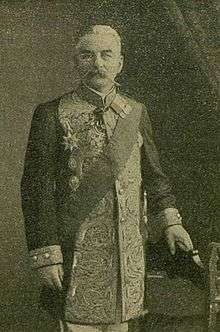Nikolai Golitsyn
Prince Nikolai Dmitriyevich Golitsyn (Russian: Никола́й Дми́триевич Голи́цын; 12 April 1850 – 2 July 1925) was a Russian aristocrat and the last prime minister of Imperial Russia. He was in office from 29 December 1916 (O.S.) or 9 January 1917 (N.S.) until his government resigned after the outbreak of the February Revolution.
Nikolai Golitsyn | |
|---|---|
Николай Голицын | |
 | |
| Prime Minister of Russia | |
| In office 20 January 1917 – 12 March 1917 | |
| Monarch | Nicholas II |
| Preceded by | Alexander Trepov |
| Succeeded by | Georgy Lvov (As Minister-Chairman of the Russian Provisional Government) |
| Personal details | |
| Born | 12 April 1850 Porechie, Moscow Governorate, Russian Empire |
| Died | 2 July 1925 (aged 75) Leningrad, Leningrad Governorate, Russian SFSR, Soviet Union |
| Nationality | Russian |
| Alma mater | Tsarskoye Selo Lyceum |
Biography
Golitsyn was born in Porechye, a village in the Moscow Governorate into the noble Golitsyn family, but passed his childhood in the Dorogobuzhsky District. He was a graduate of the Imperial Alexander Lyceum in 1871 and entered the Ministry of the Interior and appointed in Łomża Governorate (Congress Poland). He became vice-governor of Archangelsk (1879); vice-director of the Economic Department of the Ministry of Internal Affairs (1884); Governor of the guberniyas of Arkhangelsk (1885), Kaluga (1893), and Tver (1897). He was appointed Senator in 1903. As a plenipotentiary of the Red Cross in Turgay and Uralskaya Oblasts and Saratov Governorate he organized help to the famine-stricken areas (1907-1908). He was member of the State Council (1912) and chairman of the commission to render assistance to the Russian prisoners of war abroad (1915). His advanced years led him to regularly fall asleep during State Council meetings. He was a deputy chairman of one of Empress Alexandra's charity commissions.
A hesitating prince Golitsyn did not want to succeed prime minister Alexander Trepov, insisted on the resignation of the Minister of Internal Affairs Alexander Protopopov and begged Tsar Nicholas II to cancel his appointment, citing his lack of preparation for the role of prime minister. The tsar refused, but Pavel Ignatieff, Alexander Makarov and Dmitry Shuvayev were replaced.
During the February Revolution, the government had difficulties in suppressing the riots. Two rival institutions, the Duma and the Petrograd Soviet, competed for power. On 11 March [O.S. 26 February], the Tsar ordered the army to suppress the rioting by force, but troops began to mutiny and join the protesters and demanded a new constitutional government. The meeting of the Duma was prorogued by the Tsar, although Golitsyn opposed its dissolution. A private body of Duma members was formed to help restore order. "On the evening of 27 February (March 12 (N.S.) the Council of Ministers of Russia held its last meeting in the Marinsky Palace and formally submitted its resignation to the Tsar. The Provisional Committee of the State Duma ordered the arrest of all the ex-ministers and senior officials"[1] The next day Golitsyn was transferred to the Peter and Paul Fortress for interrogation. Georgy Lvov formed a new government on 2 March.
After the assumption of power by the Bolsheviks, Golitsyn was released, but forced to stay in Russia, earning his living by repairing shoes and guarding public parks. During the period from 1920 to 1924 he was twice arrested by the OGPU, on the suspicion of connection with counterrevolutionaries. After his third arrest (on 12 February 1925), he was executed on 2 July 1925 in Leningrad on the charge of participating in a "counter-revolutionary monarchist organization".[2]
Family
Prince Nikolai Golitsyn married in Saint Petersburg on 7 April 1881 Evgenia Andrejevna von Grünberg (Saint-Petersburg, 18 April 1864 - Nice, 18 July 1934). The couple had six children:
- Prince Dimitri Nikolayevich (Archangelsk, 1882 - Nice, 1928), married Frances Simpson Stevens
- Prince Nikolai Nikolayevich (Archangelsk, 1883 - Solovski, 1931), executed
- Prince Alexander Nikolayevich (St. Petersburg, 1885 - Toulon, 1974), in exile married the Imperial Princess Marina Petrovna of Russia, daughter of Grand Duke Peter Nikolaevich of Russia.[3]
- Princess Evgeni Nikolayevna (Archangelsk, 1888 - Paris, 1928)
- Princess Sofia Nikolayevna (1886 - 1891)
- Princess Olga Nikolayevna (1891 - 1892)
References
- Orlando Figes (2006) A People's Tragedy: The Russian Revolution: 1891–1924, p. 328-329.
- On the night of 15 February 1925 over 150 people were arrested, most of them graduates of the Imperial Alexander Lyceum, but also to graduates of the Imperial School of Jurisprudence.
- "Archived copy". Archived from the original on 2015-09-25. Retrieved 2015-09-24.CS1 maint: archived copy as title (link)
Sources
- V.I. Gurko. Features And Figures Of The Past. Government And Opinion In The Reign Of Nicholas II.
- Massie, Robert K., Nicholas and Alexandra, New York, Ballantine Books, 1967, ISBN 0-345-43831-0.
- Smith, Douglas, Former People: the Final Days of the Russian Aristocracy. Farrar, Straus and Giroux, 2012
| Political offices | ||
|---|---|---|
| Preceded by Alexander Trepov |
Prime Minister of Russia 29 December 1916 O.S – 27 February 1917 |
Succeeded by Georgy Lvov |